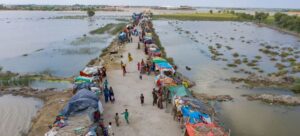The United Nations has upscaled its humanitarian appeal for the flood affected people of Pakistan to US$ 816 million from previous US$ 160 million assistance, considering a multitude of rehabilitation and health -related issues, cropping up in the post flood situation.
The United Nations on Tuesday launched a fresh appeal, urgently seeking US$816 million for aiding people affected by this year’s floods in Pakistan that its Secretary General said was caused by a “monsoon on steroids”.
This is a jump of US $ 656 million from the initial appeal of US $160 million, a joint press release said, explaining that the updated appeal is based on an updated on-ground needs assessment, especially taking into consideration rehabilitation needs of the affected regions.
Speaking at the launch of the flash appeal, Hina Rabbani Khar, Pakistan’s Minister of State for Foreign Affairs, called for comprehensive plans to equip the people in Pakistan to survive the floods and also to help them cope with future impacts of climate change.
She said it was the world’s collective responsibility to provide assistance to the people affected by the massive flash floods.
“With our characteristic resilience and endurance, and support of the international community, we are determined to overcome this challenge and bounce back stronger. There is a long road ahead of us,” she added.
The minister said that they would continue to count on sustained attention and support of the international community as they transitioned to the huge task of sustainable rehabilitation and reconstruction.
She noted the need to equip people to not only survive but also to thrive after the crises.
Coalition of the willing
Minister for Climate Change Sherry Rehman highlighted the unimaginable scale of loss and damage caused by unprecedented climate-induced floods in Pakistan.
She said that the scale of catastrophe had gone beyond all previous climate disasters, affecting a population larger than the size of many countries.
She referred to the continued inundation of large swathes of the country in pestilent water, pointing to the health risks such flooding posed, and added that Pakistan had sustained a complex and multi-sectoral exogenous shock to its economic body, and should not be expected to struggle alone in the frontlines of this climate apocalypse, while contributing less than one percent to the total global carbon emissions.
Calling for a ‘coalition of the willing’ to effectively respond to this calamity, Sherry Rehman outlined specific and urgent requirements in the areas of health, food security and rehabilitation.
Julien Harneis, Humanitarian Coordinator for Pakistan, told journalists in Geneva on Monday that there would be an increase in child morbidity, disease outbreaks such as malaria, dengue fever, and increased malnutrition, unless assistance was forthcoming.
The Government needs support to bolster health, nutrition, water and sanitation services across the affected areas of the country, he said.
“We need all of these funds, and we need them quickly,” Harneis said, adding that an international support conference will be held later this year to seek more funding for reconstruction and rehabilitation.
WHO Director-General, Tedros Adhanom Ghebreyesus, said that around 10 per cent of health facilities had been damaged in the floods.
“The loss of over 1,500 people is tragic – however it is also remarkable that many more did not perish”, he said, adding that “The water has stopped rising, but the danger has not. We are on the verge of a public health disaster.”
He said more than 2,000 women in flood-hit areas were giving birth every day, mostly in unsafe conditions.
“Many more lives than were lost in the floods could be lost in the coming weeks if we don’t mobilize greater support for Pakistan”, the WHO chief emphasised.

Rising needs
The revised ‘2022 Pakistan Floods Response Plan’ shared with UN member states and humanitarian organisations said that the enhanced appeal reflects the rising needs and the unprecedented scale of destruction caused by the current climate-induced disaster which has affected a population of 33 million, cost 1,600 lives and threatens hundreds of thousands more as a second disaster looms within the first one.
Over 2 million homes have been destroyed or damaged, forcing people to live under open skies exposed to threats of dengue, malaria, and the biting cold of the fast-approaching winter.
More than 1,500 health and support facilities were badly damaged and unable to respond to the growing needs. 13,000 km of roads were badly damaged, making it extremely difficult – and, at times, impossible – to reach families in need.
The focus of this appeal was on the provision of urgent and lifesaving humanitarian assistance and protection to 9.5 million people until 31 May 2023, with a focus on the 34 most affected districts in Balochistan, Sindh, Khyber Pakhtunkhwa and Punjab.
This prioritization is based on the number of houses damaged and destroyed, available projections of water level changes, and the population of displaced people in the districts.
It aimed to enable a more cohesive response for people in areas that have been most severely affected, and to foster a focused, multi-sectoral approach.
Pakistan’s Foreign Office, in a press release, said that the international community had stepped forward with valuable assistance. This support has been in terms of multi-purpose cash, as well as the provision of healthcare, medicines, food, water, shelter, education, and protection.
Image: Women rebuilding home following the floods in Sindh, Pakistan. They returned from the relief camps to find that their homes had vanished.

